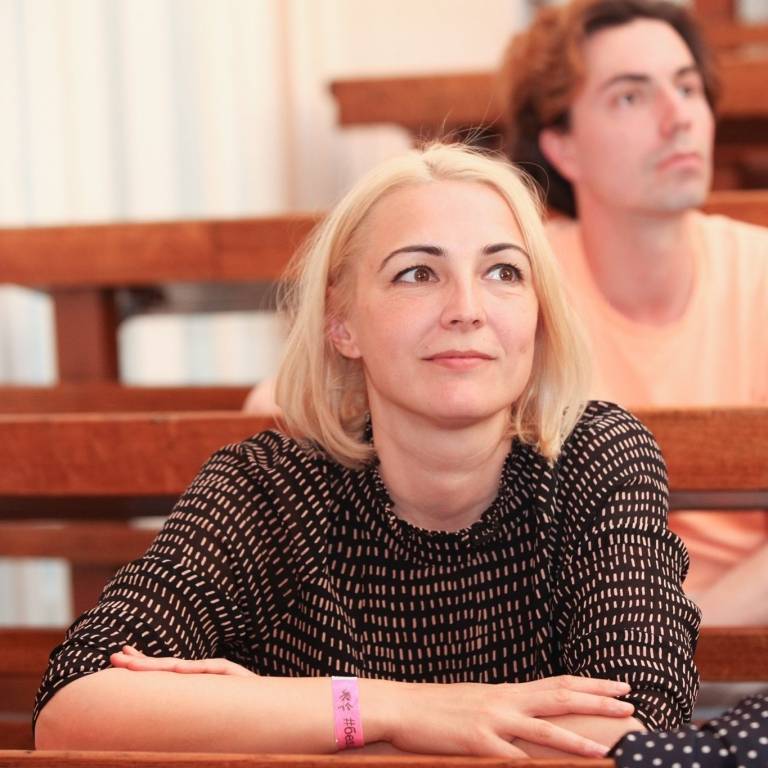Spotlight On..... Dr Anna Shadrina
19 November 2021
Spotlight on Dr Anna Shadrina, Leverhulme Early Career Fellow

What brought to you work at SSEES?
I first came to SSEES as an attendee at the conference on Soviet and post-Soviet sexualities organised by Professor Richard Mole in 2015. I was in London on a research visit at that time, and the conference consolidated my desire to pursue a PhD in the UK. I was really impressed with all the projects presented at the conference, and I became friends with many of the speakers. Since that time, I’ve known that I wanted to engage with this intellectually galvanising place, which also feels like home to me because everybody here understands the context both of my origin (I grew up in Belarus, which was still part of the Soviet Union when I was born) and of my research (all my projects focus on socio-political transformations in Russia, Belarus and Ukraine after the end of Soviet socialism).
While I was doing my PhD at Birkbeck, I worked as a PGTA at SSEES in 2018-2020. Professor Anne White was one of the examiners of my dissertation, and after my viva I was convinced that SSEES would be the ideal place to develop my career. This year, I was awarded a Leverhulme Early Career Fellowship to work on my new project at SSEES, and I’m very excited to be back in a new role.
If you weren’t working in academia, what would be your dream job?
Before starting my PhD, I worked as a journalist in Belarus for many years. I loved my job, it helped me establish a writing routine and taught me to deal with strict deadlines. But unfortunately, Belarus is not a good place to be a journalist. At some point I realised that I could contribute to social change more as a researcher, disseminating complex academic ideas in an accessible way. I have just started my first extended postdoctoral post in academia and would love to stick around for a while as I believe I have something to say. But in another life, I’d have liked to be a TV showrunner. I admire contemporary TV series and the ability of the genre to bring all the elements of art-house films to the small screen. I can create a minuscule universe by writing an article or a book. But it must feel amazing to create a bigger universe with other people – writers, actors, cinematographers, designers…
Can you tell us a bit about your research/teaching and why it’s important to study this?
My Leverhulme project explores the social and political production of ageing in Belarus and Ukraine during the covid-19 pandemic. It assesses the impact of state policies set up in response to the pandemic on the social inclusion of people aged 60 and over in these two bordering countries which have very different political and welfare systems. The two countries adopted contrasting strategies to tackle the coronavirus. In Belarus, the threat posed by covid-19 is officially downplayed, while Ukraine was among the first countries to introduce a national lockdown. Interestingly, both these responses to the pandemic were opposed by civil society as discriminatory. My study offers an insight into how the government responses to the pandemic in Belarus and Ukraine were informed by different views of capitalism and of European integration, and how the demand for justice on the part of civil society addressed the problems of older people differently.
Outside of work, how do you unwind?
My friendships are the most precious thing to me, and nothing nourishes me better than time spent with a friend. I’m also very keen on normal, healthy, boring stuff like walking, yoga, and cooking. As my secret garden, I read a lot of slash fiction. Although I do it for fun, I can always excuse myself by saying that it’s for research purposes. (But it’s not!)
If you could recommend only one book, what would it be?
It would be Sara Ahmed’s new book ‘Complaint!’ For one thing, Sara Ahmed writes like no-one else, and reading her is a pure authentic and sensual pleasure. But this book is also extremely important politically because it explores abuse of power at universities, and I think everyone should read it. In her previous works Ahmed introduced the concept of a ‘feminist killjoy’, a person who speaks uncomfortable truths, who isn’t afraid of ‘posing a problem by exposing a problem’. In this new book she introduces the concept of a ‘feminist ear’ as a repository of uncomfortable stories about bullying, harassment, and unequal working conditions in academia. If we strive for academia to be a better place, we should, as Sara Ahmed suggests, unlearn the fear of creating problems by making complaints.
What is your biggest professional achievement to date?
My second book, written in Russian and published by the leading Russian intellectual publisher Novoe Literaturnoe Obozrenie, received the book prize ‘Libmissia’ as ‘the most successful book in the period of 2017-2018 that addresses topical socio-political issues of contemporary Russia in an accessible way’. In this book I explored how the introduction of a market economy and the capitalist job-market combined with a pronatalist ideology affected women’s reproductive decisions after the end of Soviet socialism. This book is precious to me because it’s brought me new friends and collaborative projects. But it’s also dedicated to my mother, and I cherish memories of reading the manuscript to her and Mum trying her best to stay awake.
But more recently, an article based on my PhD has been accepted by a journal, which has made a significant contribution to my development as a scholar, and I can’t wait for it to be published!
 Close
Close

